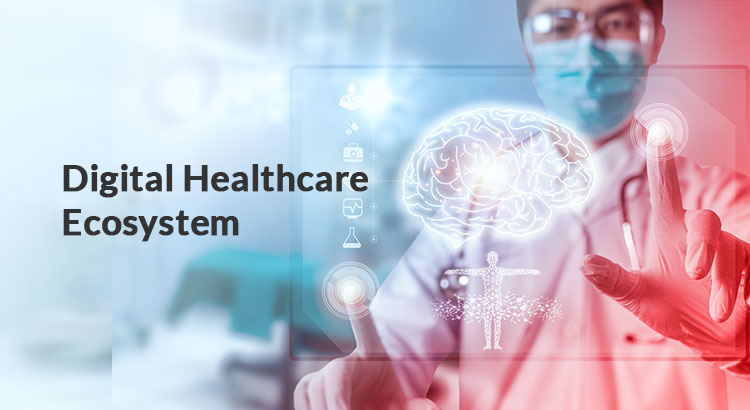The healthcare industry is arguably the most targeted by cybercriminals. Here are some of the major cyber incidents targeting healthcare companies in the last 12 months.
| Incident 1 | Cyberattack on datacenter of a major global pharmaceutical company in India. Consequently, the pharma company had to shut down some of its major facilities across the world to minimize the impact. |
| Incident 2 | The COVID vaccine data was exfiltrated during the cyber attack on a medicine agency that was closely working with a global pharma giant to develop the vaccine. |
| Incident 3 | Due to an unfortunate human error, one of the health organizations in Europe suffered a breach of data that compromised personal details of 18,000 covid infected patients. |
Amid rapid adoption of digital technologies, vast digital healthcare ecosystems have sprung up. However, the security posture to protect digital information needs to be more robust in the wake of rising cybersecurity incidents. Digital transformation has meant that there are large lakes of data — patients’ health records, R&D related data, Intellectual Property, personal health data ( healthcare devices that interacts with cloud-based servers to store and process health information) – stored in the public cloud, private cloud and outsourced to managed service providers. So, access control vulnerabilities at any of these data storage platforms can result in data breaches.
And the challenges to protect healthcare data have increased in the last 12 months. The healthcare industry faced unprecedented challenges after the COVID-19 pandemic swept across the world.
The Ponemon Institute and Verizon Data Breach Investigation Report says that the healthcare industry experiences more data breaches compared to any other industry across the globe. The latest report reveals that more than 15 million health records have been compromised till date.
Why is the Healthcare Industry prone to cyber risks?
The healthcare industry is a treasure trove of personal data, medical records, and diagnostic information along with critical third-party data. Large hospital chains, pharma MNCs, pathology labs, virtual healthcare chains, global R&D companies focused on life-saving drugs/ vaccines are the prime targets for cyber threats.
Vulnerability 1: Critical applications that store and process patients’ healthcare data are highly vulnerable to illegitimate access. Cyber incidents happen when there is a lack of rule-and rule-based access to mission-critical applications. Besides, endpoint privileges are easily available and access credentials are not changed while the authentication process is weak. And since this data is sold on the market, it incentivizes cybercriminals.
Vulnerability 2: Many healthcare organizations use third-party infrastructure to manage their 24X7 medical services. It is not uncommon to find several large healthcare chains outsource healthcare-related data for storage and processing work.
The applications and databases require 24X7 access since the attendants serving the maternity ward or emergency ward might require emergency access even in the wee hours of midnight.
In this scenario, IT risks double up if the organizations do not have any mechanism to monitor who is accessing what and for which purpose. Any unauthorized access can be catastrophic if there is no mechanism to detect and identify end-user anomalies on time.
Vulnerability 3: When there is an outbreak of a deadly disease, bio-scientists work day-in and day-out to identify the pattern of the virus or bacteria and prepare sensitive reports on that. Based on the report, they work on medications or vaccines to rescue the human race. The biological formula of the vaccines and the life-saving drugs are highly case-sensitive and are extremely vulnerable for IT threats. The malefactors that can target these sensitive information can be rogue states, cybercriminals or malicious insiders.
Safeguarding healthcare information
In all of the above vulnerabilities, poor access control mechanism, absence of governance framework, lack of endpoint privilege management, credential abuse or misuse (especially privilege passwords and keys) often results in illegitimate access to applications and databases.
Being at the forefront of protecting highly sensitive data, ARCON has been witnessing a very robust demand from the healthcare industry for Privileged Access Management deployments. ARCON | PAM enforces a governance framework that ensures any administrator or privileged user gains access to target systems only after a proper authorization and authentication process. Please read this case study to learn more about how ARCON | PAM is securing critical IT infrastructure of one of the largest healthcare chains in India.
Conclusion
The healthcare industry grabs news headlines, especially when there are epidemics. While healthcare organizations remain busy with serving mankind, cyber criminals take advantage of the social crisis and sneak into the IT infrastructure loopholes to inflict financial losses and malign goodwill. In the current backdrop, the healthcare industry is facing enormous IT risks. To improve cybersecurity measures in the healthcare industry, organizations need to continuously incorporate, customize and strengthen IT security measures to manage data assets and protect it from all malefactors.

